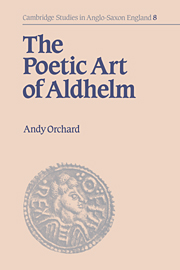Book contents
- Frontmatter
- Contents
- List of tables
- Preface
- List of short titles and abbreviations
- Sigla of scholars cited
- 1 Aldhelm's life and verse
- 2 Aldhelm and the Anglo-Latin octosyllable
- 3 Aldhelm's hexameter verse style and its origins
- 4 Aldhelm's remembered reading in verse
- Appendix 4.1 Parallel diction in Aldhelm's sources
- 5 After Aldhelm: the Anglo-Latin legacy
- Appendix 5.1 Parallel diction in Aldhelm's Anglo-Latin heirs
- Appendix 5.2 A statistical survey of Anglo-Latin verse
- Bibliography
- Index
2 - Aldhelm and the Anglo-Latin octosyllable
Published online by Cambridge University Press: 23 November 2009
- Frontmatter
- Contents
- List of tables
- Preface
- List of short titles and abbreviations
- Sigla of scholars cited
- 1 Aldhelm's life and verse
- 2 Aldhelm and the Anglo-Latin octosyllable
- 3 Aldhelm's hexameter verse style and its origins
- 4 Aldhelm's remembered reading in verse
- Appendix 4.1 Parallel diction in Aldhelm's sources
- 5 After Aldhelm: the Anglo-Latin legacy
- Appendix 5.1 Parallel diction in Aldhelm's Anglo-Latin heirs
- Appendix 5.2 A statistical survey of Anglo-Latin verse
- Bibliography
- Index
Summary
Few Anglo-Latin octosyllables survive. Only 212 such verses are attributable to Aldhelm, perhaps the first Englishman whose octosyllabic compositions remain; of these 200 are from the single (so-called) Carmen rhythmicum. Moreover, only recently has it been demonstrated conclusively that the Carmen rhythmicum is indeed by Aldhelm, a conclusion firmly supported below. Several earlier scholars, including Ehwald and Traube, had doubted the subscription finit carmen Aldhelmi (‘Aldhelm's poem ends here’) found in the sole manuscript, Vienna 751, but Michael Lapidge has shown that their suspicions were ‘founded on misunderstanding and ignorance’.
Since this Vienna manuscript seems to have been copied from materials collected by Lul, successor to St Boniface as archbishop of Mainz (754–86), and himself a former pupil of the school at Malmesbury, we may take the attribution to Aldhelm on the highest authority. Indeed, in a letter to one Dealwine, preserved in the same Vienna manuscript and dated by Tangl to 745 × 746, Lul writes from the Continent requesting certain items to be sent from England; in particular he asks Dealwine ‘ut mihi Aldhelmi episcopi aliqua opuscula seu prosarum seu metrorum aut rithmicorum dirigere digneris ad consolationem peregrinationis meae’. In the same letter Lul addresses Dealwine as his former teacher (iamdudum magistro), so he too may well have been linked to the school at Malmesbury, where he would certainly have had access to the materials requested. Since Lul's own octosyllabic compositions, as we shall see, bear clear traces of the influence both of Aldhelm's Carmen rhythmicum and other derivative pieces preserved in the same Vienna manuscript, we can perhaps assume that Dealwine successfully complied with his student's request.
- Type
- Chapter
- Information
- The Poetic Art of Aldhelm , pp. 19 - 72Publisher: Cambridge University PressPrint publication year: 1994



